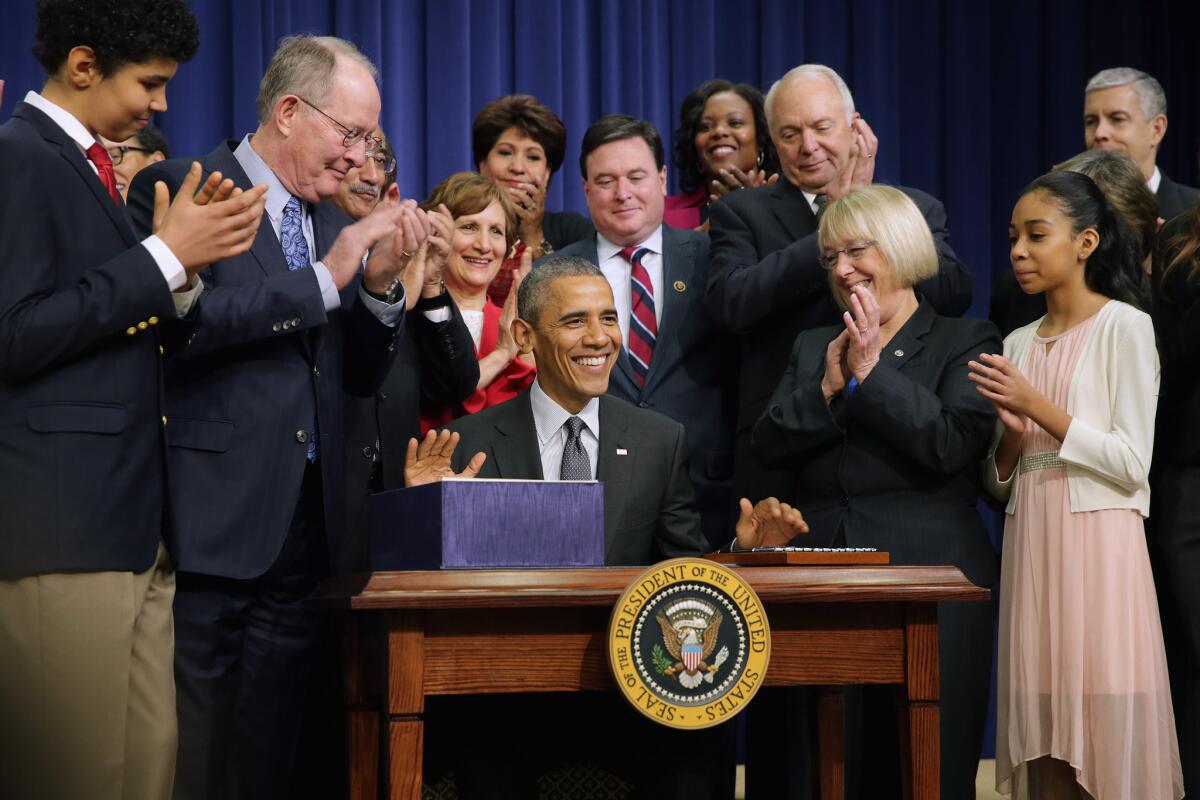Finally, California can spend millions in federal dollars on something other than ineffective tutors

Members of Congress, education leaders and students applaud after President Barack Obama signs the Every Student Succeeds Act in Washington, D.C., in December.
Starting next year, California and seven other states will have more control over how they spend the millions of federal dollars tied to a questionable tutoring program.
Under the George W. Bush administration’s No Child Left Behind law, schools that serve high concentrations of poor students and were rated as underperforming for several years were required to set aside money for tutoring, known as “supplemental education services.”
Between 2011 and 2014, California spent $507 million on these programs. But the California Department of Education routinely received complaints alleging that the tutoring companies provided little feedback on students’ academic progress, fabricated invoices and lied about enrollment and attendance information.
“We had very few criteria we could use to deny people who applied to do tutoring,” recalled California Board of Education President Mike Kirst. “We couldn’t do any evaluation of their effectiveness.”
States now will have more leeway in how to use that tutoring money, according to guidance the federal government sent last week.
The windfall in California will come out to about $233 million for the 2016-2017 school year — this year, the state spent $222 million on the tutoring programs, and $11 million on transportation to get students to tutoring sessions.
The state has not yet worked out the details of how it will spend the tutoring windfall, said California education agency spokesman Bill Ainsworth.
Kirst said that California is awaiting more details from the federal government.
States can cease the tutoring programs if they “develop and implement a one-year transition plan” for ensuring that school districts provide eligible students “alternative supports,” according to U.S. Education Department official Ann Whalen. Currently, all states except California and Nebraska, Iowa, Washington, North Dakota, Montana, Vermont and Wyoming have received waivers from some of the No Child Left Behind strictures, including the tutoring provision.
“This decision is a big win for our most vulnerable students,” state Supt. of Public Instruction Tom Torlakson said in a statement. “It will improve learning and teaching by allowing districts to more easily set up tutoring and academic intervention programs that are more effective and more accessible. … Districts know best how to serve their own students.”
Under the former law, tutoring services would promote their services to parents, and districts had to contract with them. But, according to the state, investigating the complaints tied up staff for months or years.
In late 2015, President Obama signed the Every Student Succeeds Act, a bipartisan replacement to the unpopular No Child Left Behind.
The new law does not include its predecessor’s tutoring requirements.
While No Child Left Behind was reviled for mandating regular standardized testing and using those tests scores to rate schools, the Every Student law still requires testing but allows states, within limitations, to build their own school rating systems.
Until the Every Student law goes into effect in 2017-18, the new guidance will let California’s school districts choose how to spend a few hundred million dollars to support struggling students.
Twitter: @Joy_Resmovits
More to Read
Start your day right
Sign up for Essential California for news, features and recommendations from the L.A. Times and beyond in your inbox six days a week.
You may occasionally receive promotional content from the Los Angeles Times.







